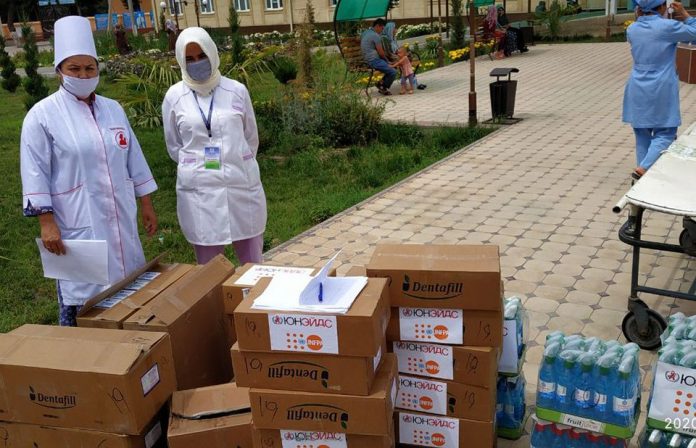UNAIDS says COVID-19 has worsened HIV situation in the Caribbean
From CNW – Caribbean National Weekly

GENEVA, July 7 – The coronavirus (COVID-19) pandemic has worsened the efforts by Caribbean countries to meet the 2020 targets on HIV-AIDS, a senior UNAIDS official said Tuesday.
UNAIDS Caribbean director, Dr. James Guwani, speaking at a virtual news conference, has warned that the pandemic may blow the Caribbean ‘of course”.
“We were not on track to meet the 2020 targets now COVID-19 increases the crisis that may blow us of the course. The report urges us to leverage HIVE leadership and lessons against this new pandemic threat,” he said.
“The crisis is an opportunity to adopt multi-monthly dispensing of HIV infections for stable patients in accordance with PAHO (Pan American Health Organisation) WHO (World Health Organisation) guidelines”.
He said most reporting Caribbean countries dispense treatment on a monthly basis and “adopting the multi-monthly dispensing would reduce the time spent in clinics both during and after COVID”.
The new report by UNAIDS shows remarkable, but highly unequal, progress, notably in expanding access to antiretroviral therapy.
It said that because the achievements have not been shared equally within and between countries, the global HIV targets set for 2020 will not be reached.
The report, titled “Seizing the moment,”, warns that even the gains made could be lost and progress further stalled if countries fail to act and highlights just how urgent it is for countries to double down and act with greater urgency to reach the millions still left behind.
With regards to the Caribbean, the UNAIDS official said many countries in the region had achieved the WHO/PAHO revalidation process in relation to mother to child transmission of the virus.
He said 86 per cent of pregnant women with HIV received antiretroviral therapy to prevent transmission to their babies in 2019.
He said the most recent data showed that while discriminatory attitudes towards people labelled HIV had been declining consistently in some countries like Belize and Guyana “they are rebounding in places like Haiti.
“But even where the situation is improving ignorance and prejudice remain high. We have to engage people consistently around ending the discrimination,” Guwani said, adding” we must also improve accountability and redress mechanism where people’s rights are violated”.
He said the 2020 Global Aids Update notes that even before COVID-219, “Caribbean states health systems were struggling to cover programmes traditionally funded by international donors including HIV Prevention in Key Population initiatives”.
He said between 2010and 2019 there was a 30 per cent decline in disbursement by global funds and a 90 per cent decline investment by the United States government.
He said HIV resources availability from domestic sources increased by 38 per cent, which is good from 2010-19, adding “it is critical that Caribbean governments guard these investments even during COVID-19.
‘We must remember why they were made in the first place. As things stand, HIV resources for the region are just 42 per cent of the 2020 targets,” he added.
The UNAIDs official said that HIV prevalence stands at 1.1 per cent in the region and that in 2019 “about three of every four people living with HIV in the Caribbean were aware of their status”.
He said that represented 77 per cent compared to the worldwide average of 81 per cent.
But he noted that 81 per cent of diagnosed Caribbean people were on treatment last year “around the same level as the global average”.
But he said progress across the testing has slowed down, noting “this means we have to expand proven methods of active case …including through community-based programmes”.
He said to reach the 1990 targets the Caribbean would need to get 42,000 more people diagnosed, 61, 000 on treatment and 75,000 barrels of pca, warning thiss may not happen.
“One hopeful finding from the report is that the Caribbean countries have what it takes to scale up HIV services and reach ambitious goals. Some countries have achieved elements of the 1990 targets, while a couple others are just shy of the target.
“Barbados has reached the target for testing, while Guyana has exceeded it with 94 per cent of people living with HIV diagnosed. Cuba is just shy of reaching the treatment target while Haiti has gotten an amazing 98 per cent of diagnosed people on treatments.”
The UNAIDS official said Barbados has almost reached the test targets, Suriname, Trinidad and Tobago have achieved significant numbers among people living with HIV requiring treatment.
“Even as we recognise these successes we must remind ourselves that unless the testing targets have been achieved all other outcomes are sub optimal, but this shows within our region we have the capacity to deploy the people policy and programmes to end AIDS.”
The UNAIDS official said last year there were 6,900 AIDS related deaths in the region, declining by 37 per cent since 2010.
CMC
For more on this story go to: https://www.caribbeannationalweekly.com/lifestyle/health-fitness/unaids-says-covid-19-has-worsened-hiv-situation-in-the-caribbean/





